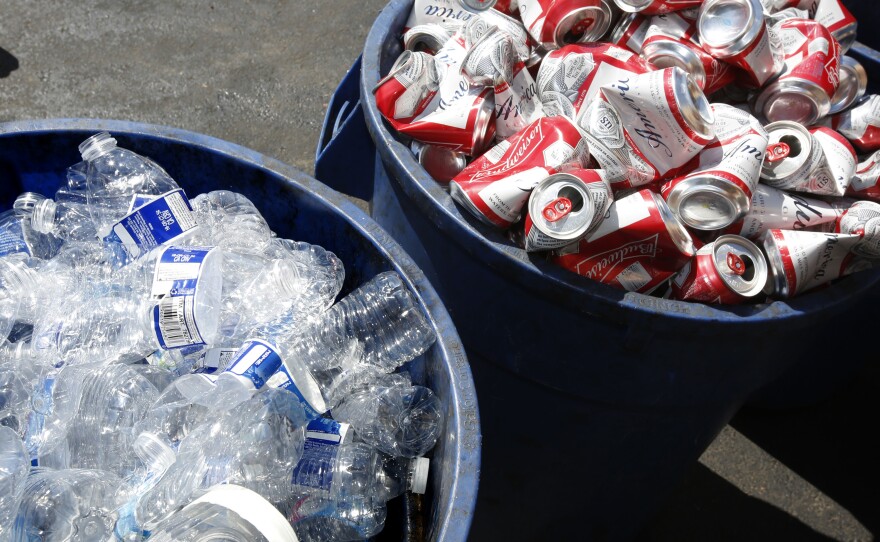Californians will have a better idea of what's headed for landfills instead of recycling centers under one of several related bills that Gov. Gavin Newsom signed into law Tuesday.
It sets the nation's strictest standards for which items can display the “chasing arrows” recycling symbol, advocates say.
Consumers assume that the symbol showing three circular arrows means that items should go into curbside recycling bins, California’s Statewide Commission on Recycling Markets and Curbside Recycling said earlier this year. It recommended that the symbol “be reserved for materials which are accepted in curbside bins and do not cause contamination.”
“It’s dishonest, it’s not fair to companies that have invested in actually making their products recyclable, and it’s not fair to consumers who pay more for something that they think will be better for the environment,” said Californians Against Waste Director of Advocacy Nick Lapis.
Sorting materials that can't be recycled from bins increase garbage rates, he added.
Opponents countered that the bill is so restrictive it could send more items to landfills.
The state regulators' list showing what's recyclable could wind up including just eight types of paper materials, two forms of glass, two types of metals, two types of plastics and one type of colored plastic, predicted a coalition of 14 opposition organizations.
The state Department of Resources Recycling and Recovery now has until Jan. 1, 2024, to publish a study on what is recyclable. The new law exempts products and packaging that is manufactured up to 18 months after the study is published.
Several states have been trying to stem confusion about recycling after a Consumer Brands Association report recently found it contributed to “a broken recycling system in America.”
Newsom, a Democrat, also approved a bill strengthening rules for what can be used in compost to prevent contamination of the soil. It requires state regulators to approve labeling rules so consumers can tell what can be composted.
The bill's author, Democratic Assemblyman Phil Ting, said some companies label items as useable for compost even though they contain harmful chemicals that make the compost unusable.
"It shouldn’t be a difficult concept: if it says ‘recyclable,’ that means you should be able to put it in the recycling bin, and if it says ‘compostable,’ you should be able to put it in the composting bin," Lapis said. "Somehow companies have decided that they can get away with marketing that that they know is deceptive because of the technicality that most things are theoretically recyclable or compostable."
A third bill expands on an existing state law that allows restaurants to distribute single-use straws only upon request. It requires take-out places to give consumers single-use condiment packages like ketchup and mustard and utensils like knives, forks and spoons only if asked.
They were among nine related bills signed by the governor, who also touted $270 million in the state budget to modernize and encourage recycling.
He also signed a second Ting bill that will ban the use of so-called “forever chemicals” in food packaging starting Jan. 1, 2023, and by 2024 will require cookware manufacturers to disclose if hazardous materials are used in their products.
Ting said PFAS, or perfluoroalkyl and polyfluoroalkyl substances, have been linked to cancer and thyroid disease and can disrupt hormones and vaccines. California joins Connecticut, Maine, Minnesota, New York, Vermont, and Washington in banning PFAS in food packaging.
A different law signed by Newsom bars the chemicals in products intended for infants and children, such as cribs and playpens starting on July 1, 2023.





